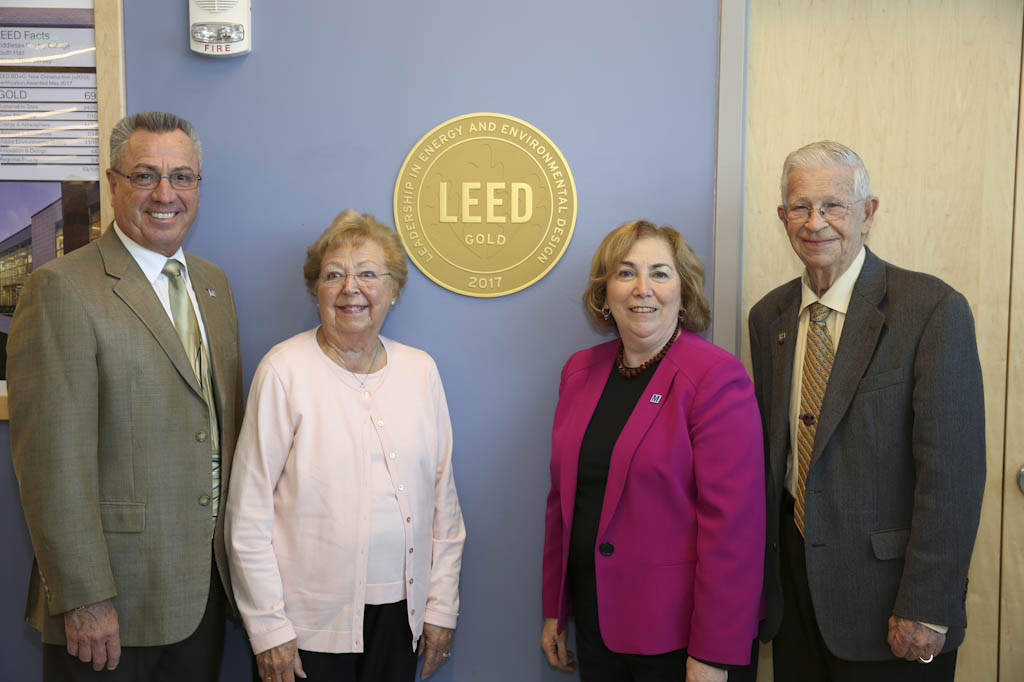EDISON — Two of Middlesex County College’s newest buildings have earned gold stars from the United States Green Building Council for their environmental friendly designs.
The achievement of earning gold LEED, or Leadership in Energy and Environmental Design, ratings for South Hall and West Hall were recognized at a ceremony Oct. 27 in the atrium of South Hall.
Middlesex County College (MCC) is the only community college in New Jersey with two gold LEED status buildings. Crabiel Hall, which opened in 2011, was awarded a silver rank.
LEED is an internationally recognized mark of excellence that provides building owners with a framework for identifying and implementing practical and measurable green building design, construction, operations and maintenance solutions.
“The LEED program encourages us to design buildings that have a low impact on the environment with optimal energy efficiency,” Donald R. Drost, executive director of facilities management at MCC, said. “It validates our efforts. MCC was able to expand the facilities on campus for our students, while minimizing the impact on the environment.”
The LEED report on the projects looked at seven areas: sustainability sites, water efficiency, energy and atmosphere, regional priority, materials and resources, indoor environmental quality, and innovation.
Middlesex County Freeholder Director Ronald G. Rios said the buildings are the most recent examples of environmental efforts in the county. He noted other efforts, which include the county’s recycling programs, two solar panel farms, the county’s fleet of hybrid vehicles and its open space preservation program, which now includes more than 8,000 acres of pristine lands saved from commercial development.
“The college has done so much for our students, continually advancing the educational opportunities available while ensuring they have state-of-the-art facilities in which to learn,” he said. “My freeholder colleagues and I are proud of the part we have had in this continual growth and success. It is no surprise that when constructing South and West Halls, the college embraced environmentally friendly building techniques and systems.”
College President Joann La Perla-Morales praised the County freeholders, the College Board of Trustees, and the State of New Jersey with supporting both projects, as well as the architects, DMR for West Hall and L.R. Kimball for South Hall.
“We are proud that as we provide state-of-the-art facilities for our students and faculty, that we have been recognized for doing so with regard and respect for our environment,” she said.
La Perla-Morales said this year faculty members have developed a new degree in Sustainability Science.
“As soon as we receive state approval, faculty and students will be engaged in their scientific work here [in South Hall],” she said thanking all the stakeholders for their work in making Middlesex County College well positioned to meet the educational needs of the community.
Dorothy K. Power, chairman of the college’s Board of Trustees, highlighted the work of the administration and facilities staff, led by Drost.
“Don Drost was persistent in demanding and acquiring the best environmentally sound facilities,” she said. “This is another example of a model building.”
Drost said LEED designation is awarded on a point system. South Hall received points for a number of its features.
He said the college sits on land that had been the Raritan Arsenal, and South Hall is where two arsenal buildings stood called South 1 and South II.
“Construction did not require clearing any natural land, it is close to public transportation, shower facilities are nearby in the Physical Education Center for bicyclists, and the surrounding suburban environment provided retail services within walking distance,” Drost said. “Points were also awarded for water and energy efficiency due to the building’s plumbing and HVAC (heating, ventilation and air conditioning) design along with the construction of rain gardens.”
He said South Hall contains a state-of-the-art HVAC system that includes energy recovery units and high efficiency fume hoods.
“Materials with recycled content and locally sourced materials were used in the construction of the building,” he said.
Drost said West Hall received points for being close to public transportation and within walking distance of retail services.
“A landscaped storm water basin was constructed to retain storm water from the parking lot,” he said. “Points were also gathered for water and energy efficiency due to the building’s plumbing and HVAC design.”
Drost said the HVAC system gathered additional points for its use of a heat recovery wheel and carbon dioxide control sensors that modulate airflow based on occupancy levels.
“Materials with recycled content and locally sourced materials were used in the construction of the building,” he said. “Finally, indoor air quality was noted through the use of clean construction practices.”
Both buildings were completed under budget.
South Hall, which is the college’s new science facility, was completed ahead of schedule and West Hall, which is the college’s Enrollment Services Center, was on schedule.

